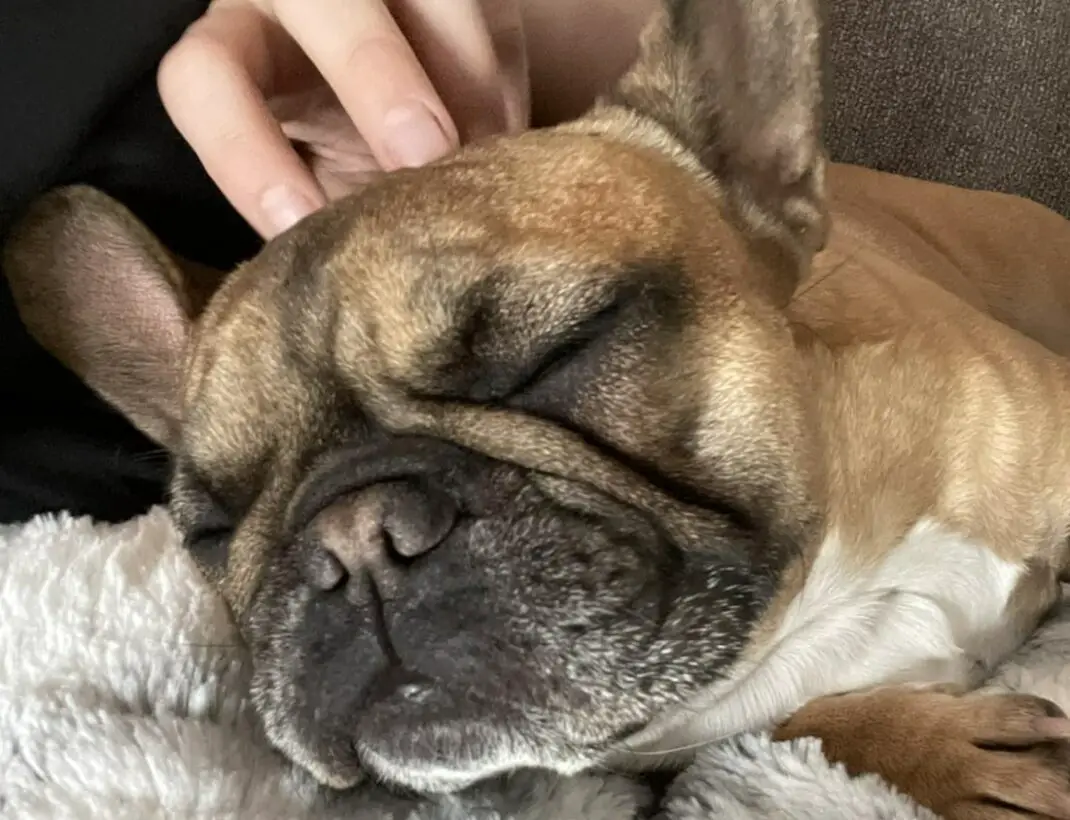French Bulldogs, affectionately known as ‘Frenchies’, are a popular breed renowned for their distinctive bat ears and charming, playful demeanor.
Despite their small size, they possess a big personality and are known for their affectionate nature and sociability.
However, owning a French Bulldog comes with its unique set of responsibilities and considerations.
From understanding their grooming and dietary needs to recognizing their exercise limitations and socialization needs, there’s a lot to know about effectively caring for a French Bulldog.
This guide aims to provide an in-depth look into what it takes to ensure a happy, healthy life for your Frenchie.
Why Are French Bulldogs So Popular?

French Bulldogs have gained immense popularity due to a combination of their unique personality traits, historical background, adaptability, representation in the media, and market demand reflected in their price range.
French Bulldog’s History
The origins of the French Bulldog can be traced back to England, where they were bred as miniature versions of the English Bulldog by lace workers.
During the Industrial Revolution, many of these lace workers migrated to France, taking these small Bulldogs with them.
These dogs quickly became a hit among the Parisian bohemian class, which played a significant role in their rise to global popularity.
French Bulldog’s Personality Traits
The personality traits of French Bulldogs, also known as Frenchies, significantly contribute to their popularity. They are often described as comical, friendly, and loving.
Their charming nature and knack for drawing attention, whether active or asleep, make them great companion dogs.
Despite their small size, their sociable nature makes them suitable for both individuals and families.
French Bulldog’s Popularity in Media
French Bulldogs have been frequently featured in movies, advertisements, social media, and even on celebrity Instagram accounts.
This media representation has helped boost their popularity, making them a sought-after breed.
Their distinctive appearance and charming personality appeal to a wide audience, further driving their demand.
French Bulldog’s Adaptability

One notable trait of French Bulldogs is their adaptability. They do well in small spaces, making them perfect city dogs.
They aren’t noisy, which is a bonus for apartment living. Also, despite being great city dogs, they can easily adapt to country activities, displaying their versatility as a breed.
French Bulldog’s Price Range
The market demand for French Bulldogs is reflected in their price range. They are highly sought-after and are considered one of the more expensive dog breeds.
Despite the high cost, many people are willing to invest in a Frenchie due to the companionship and joy they bring says Rover.
Health Considerations for French Bulldogs

French Bulldogs, while popular and charming, are susceptible to several health issues primarily due to the physical characteristics associated with their breed.
Common Health Issues in French Bulldogs
The most common health issues in French Bulldogs include Brachycephalic Obstructive Airway Syndrome (BOAS), heat stroke, skin sensitivity, and ear infections.
These dogs also tend to have a higher chance of developing health disorders compared to other breeds.
Awareness and early detection of these conditions can lead to more effective treatment and management as per AKC.
Specialized Care for French Bulldogs
Due to their unique health considerations, French Bulldogs often require specialized care.
This could involve regular cleaning of skin folds to prevent infections, maintaining a cool environment to prevent heat stroke, and feeding a balanced diet to keep their weight in check, as obesity can exacerbate many of their health issues.
Brachycephalic Syndrome in French Bulldogs
Brachycephalic syndrome is a group of upper airway abnormalities often seen in flat-faced breeds like the French Bulldog.
This syndrome can lead to severe respiratory distress and requires immediate medical attention. Symptoms can include noisy breathing, frequent panting, or difficulty exercising says The Spruce Pets.
French Bulldog’s Respiratory Problems
Due to their short snouts, French Bulldogs are prone to various respiratory problems.
These can include difficulty breathing, especially in hot or humid weather, and a higher risk of heat stroke.
Ensuring your Frenchie stays cool and avoiding over-exertion can help mitigate these risks.
Eye and Skin Problems in French Bulldogs
French Bulldogs are also prone to certain eye problems such as dry eye and conjunctivitis. Regular eye checks can help catch these issues early.
Their distinctive skin folds, while part of their charm, can also lead to skin problems such as dermatitis and pyoderma if not properly cared for.
Regular cleaning of these folds can help prevent infections and keep your Frenchie comfortable as per Pet Plan.
How To Properly Care for Your French Bulldog?

Proper care for a French Bulldog involves understanding their unique grooming and hygiene needs, exercise and play requirements, socialization needs, dietary considerations, and training and discipline approaches.
Grooming and Hygiene for French Bulldogs
French Bulldogs require regular grooming to maintain their health and appearance. This includes frequent brushing to reduce shedding and keep their coat healthy.
Their facial wrinkles should be cleaned daily to prevent bacterial buildup and infections. Regular ear cleaning is also essential to avoid ear infections, which French Bulldogs are prone to.
Additionally, dental hygiene is important, so regular teeth brushing is recommended says Britannica.
Exercise and Play Requirements for French Bulldogs
While French Bulldogs are not as active as some breeds, they still require regular exercise to maintain a healthy weight and muscle tone.
Short walks or play sessions can be sufficient.
However, due to their brachycephalic nature, care should be taken to avoid overexertion, especially in hot or humid weather, as it can lead to breathing difficulties.
Socialization Needs for French Bulldogs
Socialization is crucial for French Bulldogs. They are naturally sociable and enjoy being around people and other animals. Early socialization helps them grow into well-rounded dogs.
It’s important to expose them to a variety of people, environments, and other animals in a controlled and positive way to ensure they become comfortable in different situations.
Healthy Diet for French Bulldogs
A balanced diet is key to the overall health of a French Bulldog. They can be prone to obesity, so it’s important to monitor their food intake and ensure they’re getting the right nutrients without overeating.
A diet consisting of high-quality dog food, appropriate for their age, size, and activity level is usually recommended. It’s also important to have fresh water available at all times as per Dog Time.
Training and Discipline for French Bulldogs
Training a French Bulldog requires patience and consistency. They are intelligent dogs, but can also be stubborn.
Positive reinforcement techniques, such as treats and praise, work best for this breed. Early training and socialization are beneficial.
Also, due to their sociable nature, they respond well to interactive training sessions that involve play.
Despite their stubbornness, with the right approach, French Bulldogs can be well-trained and disciplined.
Bringing a French Bulldog Home

Bringing a French Bulldog home requires careful preparation, including preparing your home, choosing a reputable breeder, introducing the dog to your family and other pets, navigating the first few days, and creating a safe environment.
Preparing Your Home for a French Bulldog
Before bringing a French Bulldog home, it’s important to prepare your home to be safe and comfortable for your new pet.
This includes puppy-proofing areas where the dog will be spending most of its time by removing any small objects that could be swallowed, securing loose wires, and ensuring there are no toxic plants within reach.
You should also have a designated sleeping area with a comfortable bed.
Choosing a Reputable Breeder for a French Bulldog
When looking to add a French Bulldog to your family, it’s crucial to choose a reputable breeder who prioritizes the health and well-being of their dogs.
A good breeder should provide clear health records, allow you to meet the puppy’s parents, and answer any questions you have about the breed and their breeding practices.
They should also be interested in the type of home their puppies are going to.
Introducing a French Bulldog to Your Family and Other Pets
Introducing a French Bulldog to your family and other pets should be done gradually and under controlled conditions.
Initially, keep interactions short and positive, gradually increasing the length as your new pet becomes more comfortable.
If you have other pets, ensure they are also comfortable and not displaying signs of stress or aggression.
First Days at Home with a French Bulldog Puppy
The first few days at home with a French Bulldog puppy can be a period of adjustment for both you and your new pet.
It’s important to establish a routine right from the start, including feeding, potty breaks, playtime, and sleep. This helps the puppy feel secure and aids in training.
Creating a Safe Environment for a French Bulldog
Creating a safe environment for a French Bulldog involves ensuring your home and yard are secure.
This means checking for potential escape routes or dangerous areas, such as pools or high balconies.
It also includes maintaining a comfortable temperature inside the home, as French Bulldogs can be sensitive to heat. Regularly check your home for potential hazards and adjust as needed.
Conclusion and final thoughts
In conclusion, French Bulldogs are a charming and sociable breed that make great companions.
However, they come with unique health considerations and care requirements due to their brachycephalic nature and distinctive physical features.
Preparing your home, choosing a reputable breeder, and understanding how to introduce them to your family are crucial steps when bringing a French Bulldog into your home.
With proper care, attention to their dietary and exercise needs, and a safe, loving environment, a French Bulldog can be a wonderful addition to any family.
Despite the challenges, the rewards of owning a French Bulldog are immense, providing endless love, laughter, and companionship.





Leave a Reply